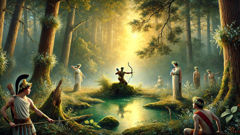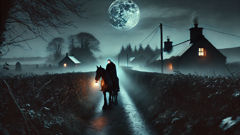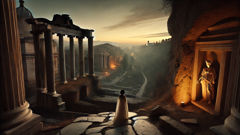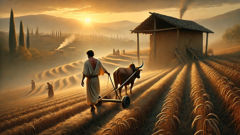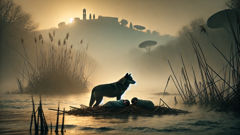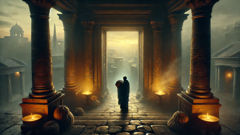Introduction
Beneath the radiant sun of ancient Greece, where olive groves tangle with wild laurel and the scent of thyme laces every breath, the world pulses with stories of gods and mortals entwined. The land itself seems to hum with magic—a place where mountains loom with silent wisdom and cool, rushing streams glisten under dappled canopies. In these forests near Thebes, hunters tread softly, always mindful that every root and shadow might be watched by capricious gods. The world feels alive, mysterious, and just a touch dangerous. Here, the myth of Actaeon takes root—a story whispered by the breeze through the pines and echoed in the wary eyes of deer. Actaeon, renowned among mortals for his skill and reverence for nature, stalked these woods with his loyal hounds and the easy grace of youth. But in lands where the divine mingles with the mortal, a single misstep can twist fate in an instant. This is a land where Artemis, goddess of the hunt and untamed wilds, roams with her nymphs—untouchable, fiercely proud, and quick to defend her sacred mysteries. It is in this realm, at the fragile boundary between man and the unknowable power of the gods, that Actaeon's journey unfolds. His tale is not merely of a hunt gone awry, but of the shattering consequences that arise when human curiosity and divine pride collide. The forest, alive with secrets and ancient echoes, waits silently to witness his transformation—from a man of skill and promise to a creature of legend whose fate would be retold for centuries. As the light dances across the leaves and the distant notes of a flute carry on the breeze, the story of Actaeon begins—marked by beauty, hubris, and the tragic price of trespassing where mortals should never tread.
The Forest’s Whisper: Actaeon's Pride and the Dance of Fate
In the emerald heart of Boeotia, where mist rises from sleeping valleys and the world feels impossibly ancient, Actaeon came of age. The son of Aristaeus, a minor deity of pastures and beekeeping, and Autonoe, daughter of Cadmus of Thebes, Actaeon inherited both noble blood and an insatiable curiosity. His days were measured by the rhythm of the hunt—bows strung at dawn, hounds bounding ahead, and the soft crunch of moss underfoot as he stalked through thickets and along deer trails. The forest was his second home, a place where he moved with reverence and understanding, alert to every rustle and birdsong. Yet beneath this reverence lay a restless ambition; Actaeon sought not only to master nature but to match the greatness of the gods themselves. To the other hunters, he was a leader, quick with encouragement or gentle teasing. To his hounds, he was both master and companion, his whistle carrying across ravines and through the shadows. He honored Artemis with sacrifices, burned laurel leaves at sacred groves, and whispered prayers to the moonlit sky. But the gods are quick to sense pride—a flicker of self-assuredness that tempts fate. And in Actaeon, there was pride enough to draw the gaze of immortals.

One morning, as the sun spilled over the low hills and painted the world in honeyed gold, Actaeon gathered his pack. The air was sweet with the promise of rain, every leaf edged with dew. The forest, alive with cicadas and distant calls of doves, felt both inviting and unknowable. He pressed deeper into the woods than ever before, driven by the thrill of the unknown, his friends falling behind as he chased the fleeting shadow of a stag. The path narrowed, hemmed in by tangled undergrowth and ancient, gnarled oaks. With every step, he felt the world grow quieter, as if he’d crossed some invisible threshold. The scent of thyme faded, replaced by something wild and pure—the unmistakable aura of the divine.
He heard it before he saw it: laughter, light and lilting as water tumbling over stones. Pausing, he parted the ferns and peered into a secluded glen. There, bathed in the soft light filtering through the canopy, stood Artemis herself. Her skin glowed like alabaster, her silver bow resting on a mossy stone. Around her, nymphs danced and splashed, their hair crowned with wildflowers. The scene was so impossibly beautiful, so untouched by mortal hands, that Actaeon forgot to breathe. For a single heartbeat, awe overcame pride; then, just as quickly, shame and fear warred within him. He knew the tales—how mortals who glimpsed what was forbidden often paid a terrible price. Yet he lingered, unable to look away.
The goddess turned, her eyes cold as river stones. For a moment, the world hung suspended between forgiveness and fury. Artemis raised her hand, droplets scattering like diamonds from her fingers. Her voice, when it came, was colder than winter’s bite: “You have seen what no mortal should see. For your trespass, you will know the terror you once inspired.” She reached for the water and flung it at him—a handful of fate, shimmering and cold. In an instant, Actaeon’s world shattered. His limbs twisted and lengthened, skin prickling with coarse fur. Horns erupted from his brow, heavy and unwieldy. His voice—his very sense of self—dissolved in a strangled cry. Staggering backward, he crashed through the brush, panic rising as his senses sharpened and his mind clouded with fear.
The transformation was agony. Every muscle screamed; his heart hammered against a ribcage suddenly strange. He tried to call out for help, for mercy, but only a guttural bellow escaped his throat. In terror, Actaeon—now a stag—fled deeper into the woods, the memory of Artemis’s wrath burning behind his eyes. Yet even as he ran, some part of him clung to hope: that he might find his friends, that someone might recognize him beneath this monstrous disguise. But fate, once set in motion by the gods, cannot be undone. And so Actaeon’s flight began—not as hunter, but as hunted.
The Flight of the Stag: Terror and the Unforgiving Hunt
Actaeon’s mind reeled as his senses bent and twisted to their new reality. Gone was the upright stance of man—now every muscle tensed for flight, every sinew straining in panic. The world unfolded in a dizzying tapestry of scents and sounds sharper than any human had ever known. Each leaf quivered with meaning; every snap of a twig sent fear surging through his veins. For the first time, Actaeon understood the terror he had so often inspired in his prey. He ran, hooves pounding through moss and bracken, heart thrumming with dread. His antlers caught on low branches as he barreled between ancient pines. The forest, once familiar and inviting, had become a labyrinth of menace.

Behind him echoed the baying of hounds. At first, hope flickered—his own pack, the loyal companions he had raised from pups. But they did not know him now. Their noses sought only the scent of the stag, their eyes wild with the thrill of the chase. Actaeon tried to call out, but only a ragged bellow escaped his muzzle. Panic threatened to overtake him as the hounds gained ground. He darted left, then right, crashing through brambles that tore at his hide. His mind swam between human memory and animal instinct—a torment more profound than any physical wound. He remembered each hound by name—Ladon, swift as wind; Aello, fierce and loyal; Melanchaetes, whose keen nose never failed. Their cries were familiar yet terrifying, ringing through the woods as a promise of doom.
He burst through a thicket into a sunlit meadow, breath heaving in ragged gasps. The world blurred at the edges—every color brighter, every shadow deeper. He felt the urge to run and keep running until his legs gave out. But there was no escape; already the pounding of paws closed in behind him. He glimpsed the faces of his fellow hunters—friends who would have recognized his laugh or smile. Now, they saw only prey. Arrows whistled past him, splitting the air, thudding into bark and earth. A sharp pain lanced his flank—a glancing blow, enough to drive him onward in terror. Despair settled over him; he understood now the absolute powerlessness of the hunted, the weight of a world that would not listen to his cries.
The forest closed around him as he veered toward a rocky stream. Water splashed against his legs, cold and clear. For a moment, he paused—panting, trembling, staring at his reflection in the eddying pool. The face that stared back was no longer his own: wild eyes, flaring nostrils, antlers framing a head foreign and strange. The memory of Artemis’s gaze burned within him—implacable, cold, and utterly indifferent to his suffering. Desperation welled inside him. He tried to speak, to beg for mercy, but only a low, guttural sound rippled across the water.
The hounds broke through the trees in a wave of fur and fury. They surrounded the stag—once their master, now their quarry. Actaeon’s heart shattered as they leapt upon him, their teeth seeking purchase on the flesh they did not recognize as their own. The hunters arrived moments later, bows lowered in awe at the size and beauty of the beast. None saw the flicker of human understanding in the animal’s eyes. None heard the silent plea carried on the wind. As the sun dipped behind the hills and shadows grew long across the meadow, Actaeon’s story came to its tragic end. The forest, always watchful, absorbed the silence that followed—the last breath of a man who had become legend.
Conclusion
The story of Actaeon lingers in the hush that settles over ancient forests as dusk descends—a haunting reminder of the fragile boundary between mortal ambition and the inscrutable will of the gods. His transformation from masterful hunter to hunted stag echoes through the ages as a warning against pride and trespass. In Actaeon's desperate flight and final, unrecognized plea for mercy lies a profound truth: to enter the sacred places of the divine without invitation is to invite ruin. The wild is not only a place of beauty and bounty but also of mystery and vengeance—a realm fiercely protected by Artemis and her kin. Yet, within this tragedy, there is also an uneasy reverence. The myth urges humility before nature’s power and respect for boundaries that cannot be crossed without consequence. As the years pass and new hunters stalk the woods, Actaeon's fate remains carved into the memory of the land—a legend recounted wherever mortals gather to speak of gods, fate, and the price of seeing what should remain hidden.

